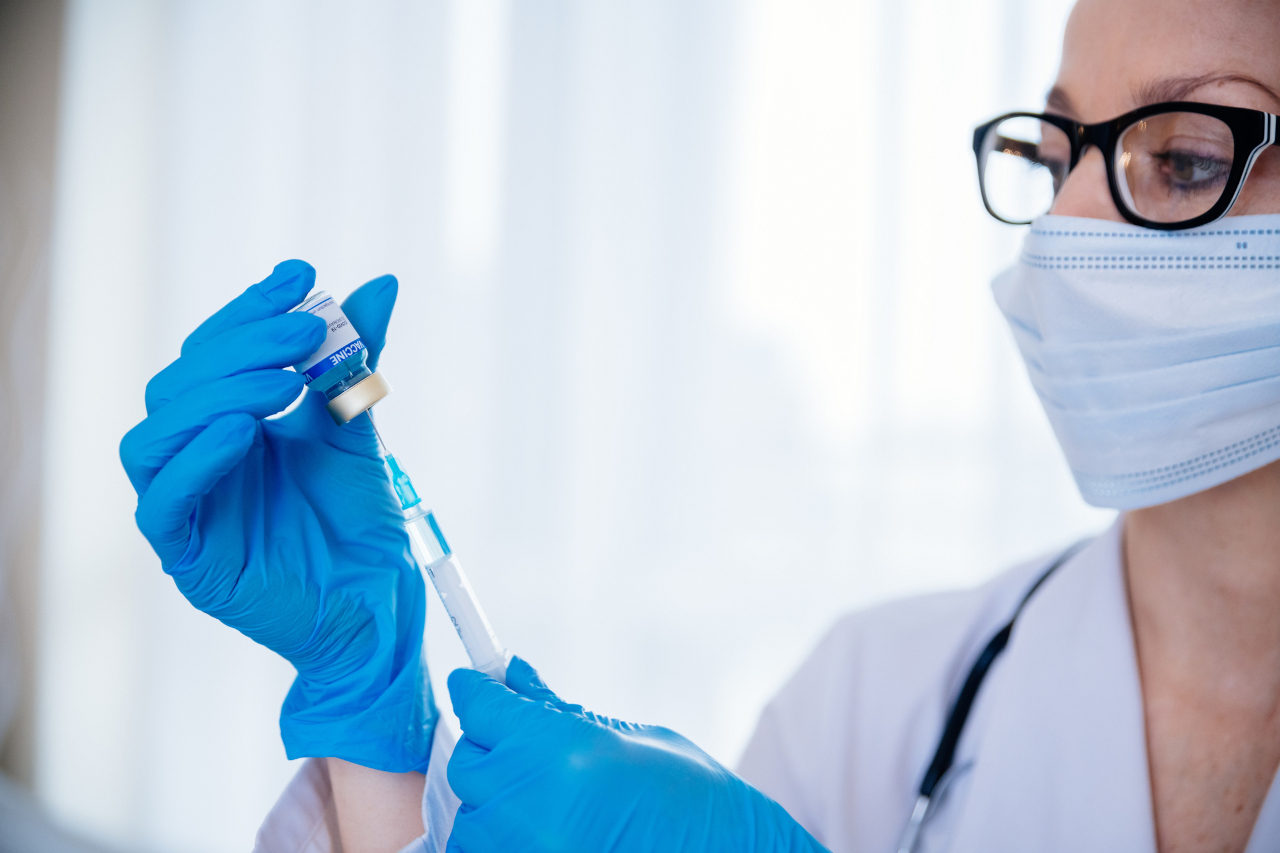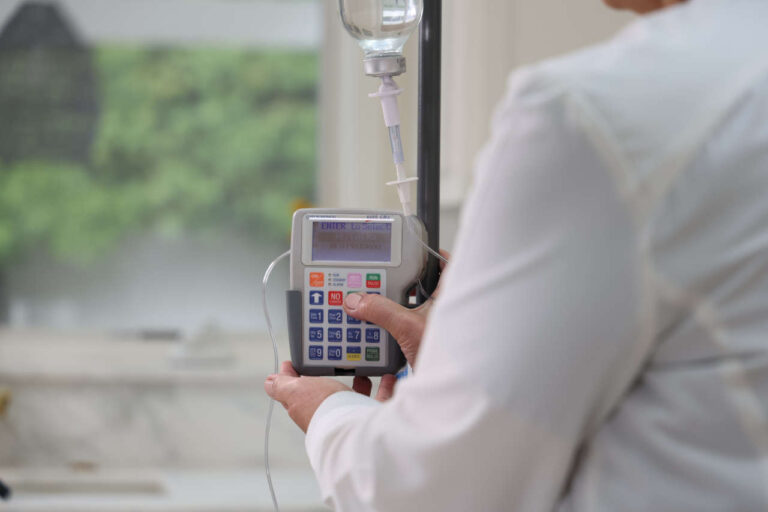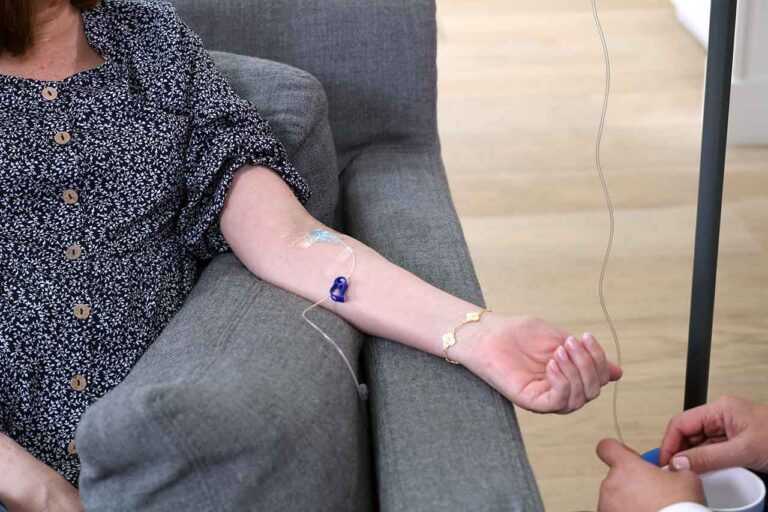
This page is an in-depth guide about all the IVIG brands and their differences.
IVIG is the acronym for Intravenous Immune globulin. Doctors mainly prescribe it for autoimmune or immunological disorders (diseases in which your immune system attacks your cells or organs).
Doctors administer some IVIG products intravenously, while others are administered both subcutaneously or intravenously.
Get IVIG Copay Assistance
Speak to a SpecialistThere are ten different brands of IVIG. This article will discuss all the IVIG brands and immunoglobulin drug names in detail.
Intravenous Immune Globulin, Defined
Antibodies, also known as immunoglobulins, are proteins our body’s immune system makes to fight infections.
However, sometimes the body cannot make those antibodies due to autoimmune diseases. In other instances, the antibodies are there. But because of a disorder, they do not function correctly. In these cases, doctors have to administer antibodies externally as a medicinal product or drug.
Intravenous immune globulin (IVIG) is a treatment containing antibodies (taken from human blood/pooled plasma of blood donors). Doctors administer it intravenously or subcutaneously to the patient. For some brands, IVIG therapy can be given to children starting from two years of age.
What Is IVIG Approved For?
The FDA (Food and Drug Administration) has approved IVIG for ADMA Biologics (a biopharmaceutical company that manufactures and markets plasma-derived products to treat infectious and immunocompromised diseases).
The FDA approves different immunoglobulin drug names for the following conditions:
- Idiopathic (immune) thrombocytopenic purpura (ITP)
- Kawasaki’s vasculitis
- Primary immunodeficiencies
What Is IVIG Used To Treat?
IVIG is used to treat several autoimmune, infectious, or idiopathic diseases. The primary conditions that IVIG is used to treat are listed below:
- Immune thrombocytopenia (IT): This disease occurs when your body doesn’t have enough platelets to clot blood. Immune thrombocytopenia occurs because your immune system has destroyed or attacked the platelets. Nearly all IVIG brands can treat this disorder.
- Chronic inflammatory demyelinating polyneuropathy (CIDP): This neurological disease targets the patient’s peripheral nerves.
- Kawasaki disease: This disease causes inflammation or swelling of the blood vessels in the entire body.
- Myasthenia Gravis: Myasthenia Gravis is an autoimmune disease in which antibodies destroy the communication between nerves and muscles. This results in the weakening of skeletal muscles.
- Lupus: Lupus is an autoimmune disease in which the immune system attacks the body’s organs and tissues.
- Myositis: Myositis is the inflammation of your voluntary muscles due to any autoimmune disease, injury, or infection.
- Multifocal motor neuropathy (MMN): In this disease, your body’s immune system attacks the focal areas of numerous motor nerves.
Treatment Info
Get IVIG Prior AuthorizationWhat Are the IVIG Brand Names?
The ten different immunoglobulin drug names are:
- Bivigam
- Carimune
- Flebogamma
- Gammagard S/D (low IgA)
- Gammagard Liquid
- Gammaked
- Gammaplex
- Gamunex
- Octagam
- Privigen
What Is the Best Brand of IVIG?
IVIG contains IgG antibodies as its primary component. It also has IgE, IgA, IgM, and IgD antibodies in lower amounts.
For patients who have IgA antibodies, IVIG brands containing lower levels of IgA are preferred to avoid any adverse events. However, for patients deficient in IgA antibodies, you should not give brands with low IgA levels.
Gammagard S/D contains the lowest concentration of IgA (1 mcg/ml in a 5% solution). For this reason, it is the best brand for patients with sufficient IgA antibodies. Brands like Flebogamma and Gammaplex also have low IgA levels.
IVIG Price
IVIG cost can vary from patient to patient, but IVIG is generally quite expensive.
Why is IVIG so expensive?
IVIG therapy is expensive because of the high cost involved in manufacturing and administering the medicine.
A patient’s overall IVIG therapy cost starts from $5,000 to $10,000. This cost can vary depending on the number of infusions administered and the patient’s weight (not including the hospital stay charges).
The per-gram cost of IVIG ranges from $100 to $350.
Which Pharmaceutical Companies Make IVIG?
Pharmaceutical companies that manufacture different brands of IVIG are:
- Biotest AG
- Octapharma AG
- Grifols, S.A.
- LFB Biotechnologies
- Takeda Pharmaceutical Company, Limited (Shire PLC)
- Bio Products Laboratory, Ltd.
- Baxter International, Inc.
- ADMA Biologics, Inc.
- Kedrion Biopharma, Inc
- BDI Pharma, Inc.
- CSL Behring
Home Infusion
We Come To YouIVIG and Normal Saline Compatibility
Normal saline is used and preferred for flushing IV lines before and after IVIG administration. However, because it is incompatible with some IVIG brands, such as Gammagard, it is not recommended as a diluent.
If hydration is needed during IVIG therapy, Vaughan Nufactor recommends using D5W hypotonic saline solution, as this solution is compatible with IVIG and can run simultaneously with IVIG.
Diabetic patients should not receive immunoglobulin drug names containing a sugar solution or dilution with D5W hypotonic saline solution.
IVIG Brand |
Reconstitution Required |
IgA Content |
Available Concentrations and Routes of Administration |
Sugar Content |
Reviews and Ratings on Drugs.com |
| Bivigam | Liquid form, ready to use. | Less than or equal to 200 ug/ml | 10% liquid solution (IV) | No sugar added. | 7.0/10 |
| Carimune NF | Yes. Available in powder form. Should be reconstituted before use. | 720 ug/ml | 3% to 12% (IV) | Sucrose present | 7.0/10 |
| Flebogamma DIF | Liquid form, ready to use. | Less than 3 mcg/ml | 5% and 10% liquid solution (IV) | No sugar added. | 7.0/10 |
| Gammagard S/D | Yes. Available in powder form. Should be reconstituted before use. | Less than or equal to 2.2 ug/ml | 5% and 10% (IV) | Glucose was added to this IVIG brand. | 7.0/10 |
| Gammagard Liquid | Liquid form, ready to use | 37 ug/ml | 10% liquid solution (Can be given intravenously or subcutaneously.) |
No sodium, preservatives, sucrose or added sugars. Should be used immediately after opening. | 6.3/10 |
| Gammaked | Liquid form, ready to use. | 46 ug/ml | 10% liquid solution (Can be given intravenously or subcutaneously.) |
No sugar added. | 7.0/10 |
| Gammaplex | Liquid form, ready to use. | Less than 4 mcg/ml for 5%; less than 20 mcg/ml for 10% | 5% and 10% liquid solution (IV) | D-sorbitol present in 5% solution. | 7.0/10 |
| Gamunex-C | Liquid form, ready to use. | 46 ug/ml | 10% liquid solution (Can be given intravenously or subcutaneously.) |
No sugar added. | 8.7/10 |
| Octagam | Liquid form, ready to use. | Less than 100 ug/ml in 5% solution; average of 106 ug/ml in 10% solution | 5% and 10% liquid solution (IV) | Maltose present. | 8.5/10 Some patients experienced mild headaches with this IVIG brand. |
| Privigen | Liquid form, ready to use. | Less than or equal to 25 mcg/ml | 10% Protein Liquid (IV) | Stabilized with proline. No sugar added. | 5.5/10 One patient reported experiencing anaphylactic shock after taking Privigen for primary immunodeficiency. For the other patient, the drug was beneficial with no dangerous side effects. |
Get IVIG Copay Assistance
Speak to a SpecialistIVIG Brands
Detailed reviews of all immunoglobulin drug names are given below. Doctors may adjust the dosages according to the disease and the patient’s condition or response.
1. Bivigam: 10% Liquid Solution
Overview:
Bivigam is a 10% liquid solution that doctors administer intravenously. The drug contains a 10% (100 mg/ml) IgG antibody level.
Treatment:
Bivigam, 10% liquid, is mainly indicated for treating primary humoral immunodeficiency (PI) or raising platelet levels.
What is PI?
Primary humoral immunodeficiency is defined as a set of various disorders. In these conditions, the patient encounters B cell-intrinsic abnormalities, resulting in a decrease in B cell production and a lack of normal antibody production.
Common Side Effects of This IVIG Brand Include:
- Fatigue
- Headache or migraine
- Nausea
- Diarrhea
- Muscle and back pain
- High blood pressure
Adverse Effects Include:
- Thrombosis
- Infusion site reaction
- Sinusitis
- High blood pressure
Dosing
The recommended dose for Bivigam given in primary humoral immunodeficiency is 300 – 800 mg/kg, delivered every 3 to 4 weeks.
The exact dose of IVIG drugs may vary from patient to patient according to their condition and response. Doctors may adjust the dosage with time to achieve the desired trough level (minimum drug concentration in blood).
Price
The price for Bivigam 50 ml starts at $704.
2. Carimune
Treatment
Carimune is one of the IVIG brands used to treat primary immunodeficiency (PI). In this disease, patients have weakened immunity because their immune system is not working properly. As a result, the chances of infections and sickness increase.
Common Side Effects of This Immunoglobulin Drug Name Include:
- Cough and difficulty breathing
- Fever
- Fatigue
- Pale skin
- Runny nose
- Weakness and chest tightness
Dosing
0.4 – 0.8 g/kg every 3 to 4 weeks by IV infusion.
3. Flebogamma
Treatment
Doctors administer Flebogamma if a patient doesn’t have enough antibodies to fight infections or is suffering from a condition associated with an inability to produce enough antibodies (e.g., primary immunodeficiency).
This IVIG brand also treats certain immune disorders, such as:
- Hypogammaglobulinemia ⏤ reduction in the levels of antibodies.
- Idiopathic thrombocytopenic purpura (ITP) ⏤ insufficient platelets in the blood.
- Kawasaki disease ⏤ inflammation in several organs of the body.
- Guillain-Barre syndrome ⏤ inflammation of the nerves throughout the body.
Can IVIG help?
Free IVIG Treatment InfoSide Effects Include:
- Headache
- Fast heart rate
- Fever and chest pain
- Chills
- Vomiting and nausea
- Back pain or muscle pain
- Dizziness and diarrhea
- High or low blood pressure
Dosing (for PI)
300 – 600 mg/kg every 3 to 4 weeks. 1 mg/kg per minute should be given as the initial infusion rate, followed by a maintenance dose (if tolerated) of 8 mg/kg per minute.
4. Gammagard S/D (low IgA)
Treatment
Gammagard S/D is one of the IVIG brands with the least amount of IgA, which is less than 2.2 ug/ml in a 5% solution. It can treat the following conditions:
- Primary immunodeficiency
- Chronic ITP
- Other immune disorders
Common Side Effects of This Immunoglobulin Drug Name Include:
- Dizziness
- Joint pain
- Fever
- Earache
- Throat irritation
- Skin rash
- Headache and cough
- Nausea and vomiting
- Diarrhea
Severe Side Effects Include:
- Breathing difficulties and wheezing
Dosing
300 – 600 mg/kg for PI, infused every 3 to 4 weeks.
5. Gammagard Liquid
Treatment
Gammagard liquid, a ready-to-use liquid product, is the first FDA-approved IVIG brand doctors use to treat multifocal neuropathy. It is also given for primary immune deficiency syndromes and contains immunoglobulin IgG to protect the body and fight infections.
Common Side Effects Include:
- Headache
- Nausea or vomiting
- Back or joint pain
- Muscle cramps
- Dizziness
- Fever
- High blood pressure
Consult your doctor if any of these symptoms worsen or persist for an unusual duration.
Severe Side Effects Include:
- Fainting
- Bleeding or bruising
- Irregular heartbeat
- Abnormally high blood pressure
Dosing
The typical dose for patients with a primary immune deficiency is 300 – 600 mg/kg administered every 3 to 4 weeks.
Price
The price for a 10 ml, 10% liquid solution of this IVIG brand is $165.33, but it can vary slightly for different pharmacies.
Consult an IVIG Specialist
The Best IVIG Home Infusion | Get IVIG Treatment Assistance6. Gammaked
Treatment
Gammaked is one of the most well-known immunoglobulin drug names administered subcutaneously or intravenously to treat PI in adults and children two years or older.
Gammaked should be administered only intravenously for the treatment of ITP and CIPD. (Only adults can receive it for treating CIPD).
Side Effects Include:
- Cough and sore throat
- Runny nose
- Sinusitis
- Headache
- Fever
- Chills
- Nausea
- Diarrhea
- Fatigue
- Joint pain
- Back pain
- Upper respiratory tract infection
- Bronchitis or asthma
- Allergic reaction (rash, redness, pain, or itchiness at the site of injection or elsewhere)
Dosing
The dose of this IVIG brand for PI is 300 – 600 mg/kg administered intravenously every 3 to 4 weeks. Doctors can adjust it according to the patient’s response.
Price
A 10 ml supply of Gammaked 10% solution costs around $176.
7. Gammaplex
Treatment
Gammaplex treats the following conditions:
- Primary humoral immunodeficiency in patients who are two years and older. Diseases may include:
- X-linked agammaglobulinemia
- Wiskott-Aldrich syndrome
- Congenital agammaglobulinemia
- Combined immunodeficiency diseases
- Chronic immune thrombocytopenic purpura (ITP) to increase platelet levels.
Common Side Effects Include:
- Nausea or vomiting
- Dehydration
- Chest pain
- Headache
- Dizziness and fever
Seek immediate medical attention if side effects persist or worsen.
Serious Side Effects of This IVIG brand Include:
- Vomiting and dehydration
- Thrombosis
Dosing
For patients with PI, the recommended dose of this immunoglobulin drug name is 300 – 800 mg/kg, administered every 3 to 4 weeks.
For patients with ITP, the recommended dose is 1 g/kg for two consecutive days.
Price
Gammaplex 5% costs around $940 for a 100 ml intravenous solution.
8. Gamunex
Gamunex can be used to treat:
- Primary humoral immunodeficiency diseases in patients who are two years or older.
- ITP in adults and children
- CIDP in adults
Ask About IVIG Home Infusion
Common Side Effects Include:
- Headache
- Dizziness
- Cough
- Nausea and vomiting
- Fever or chills
- Back or joint pain
- Pain and swelling at the site of injection
Consult a doctor if symptoms persist with this IVIG brand.
Serious Side Effects That Require Immediate Consultation Include:
- Fast heartbeat
- Excessive tiredness
- Inflammation of the brain
- Severe headache
- Sensitivity to light
Dosing (for PI)
300 – 600 mg/kg administered every 3 to 4 weeks.
Price
The average cost is $145 for 10 ml.
9. Octagam
Treatment
Octagam can be used to treat:
- PI
- ITP
- Dermatomyositis (DM) in adults
Common Side Effects Include:
- Mild headache
- Tiredness
- Dizziness
- Minor chest pain
- Pain and swelling at the injection site
- Abdominal or back pain
- Muscle cramps
Serious Side Effects Include:
- Kidney, liver, or lung problems
- Blood clots or initial signs of blood clots in the brain, heart, lungs, or legs.
Dosing
Doctors can adjust the dose of this IVIG brand according to the patient’s response. The recommended dose for Octagam 5% liquid for PI diseases is usually 300 – 600 mg/kg administered every 3 to 4 weeks.
Price
Octagam 10% costs $385 for 20 ml.
10. Privigen 10% Protein Liquid
Privigen is one of the ready-to-use immunoglobulin drug names made with IgG antibodies given to patients as their IgG therapy. It was proven to be safe in clinical trials. It is also the only IVIG brand and immunoglobulin therapy stabilized with proline.
Proline, a naturally occurring amino acid, is incorporated to keep the product stable at room temperature. It can be convenient for patients because they do not have to store Privigen in the refrigerator.
Privigen must not be given to patients with hyperprolinemia (excess proline in the blood) since the product already contains proline. Using Privigen in these patients may aggravate their condition.
Treatment/Therapy:
Privigen can treat the following conditions:
- Various types of primary immunodeficiency (PI).
- Chronic immune thrombocytopenic purpura (ITP) for patients over 15.
- Chronic inflammatory demyelinating polyneuropathy (CIDP) in adults.
Common Side Effects of This IVIG brand Include:
- Headache
- Nausea
- Fatigue
- High blood pressure
- Fever
Serious Side Effects That Patients Should Report Immediately Include:
- Serious allergic reaction.
- Shock, chest tightness, breathing difficulty, or wheezing.
- Sudden weight gain.
- Worsening of common side effects like excessive drowsiness, high fever, headache, stiff neck, or fatigue.
- Pain or/and swelling in arms or legs.
- Difficulty in urine output.
Dosing
The typical dosage for treating PI with this immunoglobulin drug name is 200 – 800 mg/kg, administered every 3 to 4 weeks.
The dose for chronic ITP is 1 g/kg for two consecutive days.
Price
The price for this IVIG brand is $804 for 50 ml.
Get IVIG Copay Assistance
IVIG Financial AssistanceAre There Different Types Of IVIG?
There are mainly five different types of IVIG (immunoglobulin).
- IgG
- IgA
- IgM
- IgE
- IgG
The primary component in IVIG is the IgG antibody, while the other antibodies are present in trace amounts. The IgG antibody is the primary antibody present in our blood.
IgG is more durable than IgM. It is also a fundamental component of the humoral immune system.
SCIG (Subcutaneous Immunoglobulin) Brands as an Alternative to IVIG Brands
Doctors can administer the different immunoglobulin brands either subcutaneously or intravenously.
Subcutaneous immunoglobulin can treat primary immune disorders.
SCIG brands include:
- Gammagard liquid
- Gammaked
- Gamunex
Conclusion
There are ten different IVIG brands. All immunoglobulin drug names included here can help treat autoimmune diseases such as primary immunodeficiency and chronic idiopathic thrombocytopenic purpura.
However, some brands are unsuitable for diabetic patients due to their sugar content. Other brands, such as Gammagard S/D, are appropriate for patients with IgA antibodies. Patients with hyperprolinemia should not use Privigen. In short, the specific brand used will depend on each patient’s condition and disorder.
Healthcare professionals should remain cautious and carefully consider the patient’s history before prescribing any IVIG brand.
The dosage of each IVIG drug may vary for each patient. Doctors should modify it during therapy to achieve the desired therapeutic response.
To delve deeper into the various facets of IVIG, please visit our IVIG Patient Resource Hub.













